It is possible to farm at the current 220kg of organic nitrogen (N) per hectare (N/ha) and deliver good water quality
Agribusiness All Beef Co-op Corporate Dairy
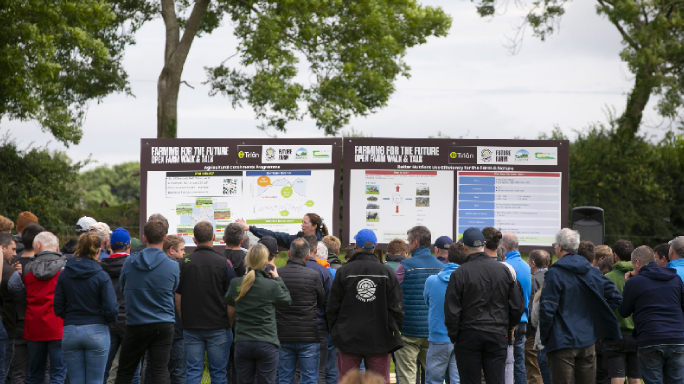
Over 300 farmers attended the Tirlán and Teagasc ‘Farming for the Future’ water quality event on the farm of Donal Kavanagh, near Baltinglass, Co Wicklow. The event offered farmers action-focused advice and showed the significant efforts that farmers are undertaking to stabilise and improve water quality in their region.
It is part of Tirlán’s collaborative ‘Farming for Water: River Slaney’ project that is working to improve water quality and assist Ireland in putting the best possible case forward for retention of the Nitrates Derogation. Speakers at the event included representatives from Tirlán, Teagasc, Department of Agriculture, Environmental Protection Agency (EPA), Irish Farmers’ Association (IFA), the ICMSA and Local Authority Waters Programme (LawPro).
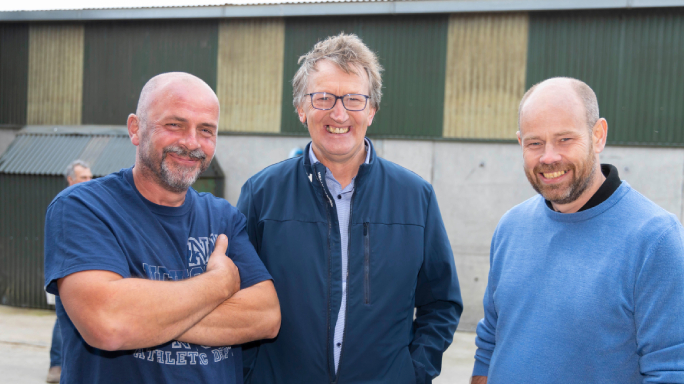
The event heard that a focus on nutrient use efficiency (NUE) on farm can deliver or maintain higher output at a lower cost. Teagasc Director Dr Frank O’Mara highlighted that it is possible to farm at the current 220kg of organic nitrogen (N) per hectare (N/ha) and deliver good water quality.
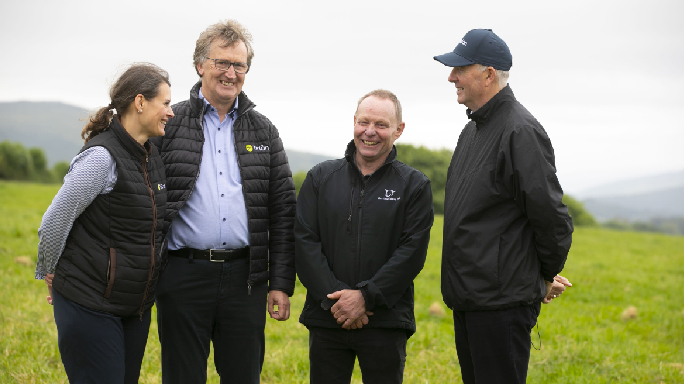
Dr Lisa Koep, Chief ESG Officer, said the turnout for the event on Donal Kavanagh’s farm showcases how focused the farmer-owned cooperative’s suppliers are on improving water quality.
“Farmers are truly committed to making the changes on the ground to fix water quality. Events like this are taking place all over the country and are hugely important. It showcases to all of the stakeholders that we are committed as an industry to improving our water quality.”
Nitrates Derogation
Dr Frank O’Mara, Director of Teagasc, said: “We absolutely can farm at 220 and be compliant with water quality. We have brought in lots of measures to reduce nitrogen such as lower stocking, banding etc. We hope to see the impact of these measures soon. The Department, government and all of our partners are putting the best foot forward for the benefit of the sector and the derogation is a critical part of that.”
The Nitrates Derogation is hugely important to Irish agriculture and losing it “would be like a hard Brexit for the dairy sector”, Tadhg Buckley, Director of Policy and Chief Economist at the IFA, has warned.
“Much of the commentary has been that it is just a derogation or a dairy farm issue. The reality is that it is an economy-wide issue. One in ten hectares in Ireland at the moment is farmed under derogation. If you look at a county like Cork or Kilkenny, one in four hectares are under derogation.
“So any change to that derogation is going to have a massive impact on the derogation dairy farmers, the non-derogation dairy farmers if they’re in the land market; non dairy farmers as it has such an impact on land demand and the downstream industries like the processors and other sectors that are dependent on us progressing in terms of a dairy perspective,” he said.
Focus on water quality
Mary Gurrie, Programme Manager of the Environmental Protection Agency (EPA) Water Programme, said the goal is to protect good and high water quality areas and improve those which are not meeting good status.
“In the past number of years, particularly the past four of five years, there has been much more of a focus on improving water quality across all sectors, agriculture, waste water, forestry and others and we can see that. Over the past year with the focus on the derogation, the ante has been upped again.
“There is a lot of information now in terms of what the problem is, where the problem is and what the solutions are in terms of the science coming from Teagasc and the EPA and putting that all together and providing information to farmers to help them make the right choices that work for them and work for the environment. We all benefit from events like this where people are all learning from one another, seeing things in practice and on the ground.”
The new Water European Innovation Partnership (EIP) project was also discussed and the financial supports available to address on-farm water quality challenges.
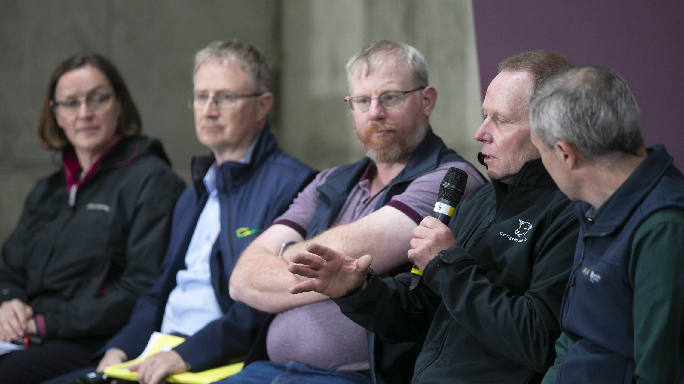
Government Commitment
The reality is that the task ahead is challenging, Noeleen McDonald, Assistant Agricultural Inspector with the Department of Agriculture, told those gathered. “The government is committed to securing the derogation. All sectors in agriculture have to work together to achieve this. It is an understandable challenge.”
Bill Callanan, Chief Inspector, Department of Agriculture, said the uniqueness of our grass-based outdoor system is not a strong enough basis on which to retain the derogation. “We are not unique in terms of our target which is improving water quality. Every country has committed to this, right across Europe.
“Our grass-based outdoor system is not commonplace in Europe. But that must be compared as well to that requirement in terms of ensuring good water quality. The Commission has been clear. They want to see in good status areas that this water quality is maintained. And that in less than good areas that we are on a trajectory of improvement. I’m at this a long time and what I see now is that there is an engagement of industry, of farmers etc towards that objective and we have to harness that.
“We sit on a three legged stool in terms of regulatory, state supports and sector initiatives. There are regulations, and nobody likes regulations, but they are necessary requirement to stop poor practice. Most farmers are way above that standard already. We have reduced chemical fertiliser allowances and we have extended the closed period. That clearly is an area of loss. We’ve introduced the fertiliser database. Those are the elements in terms of the regulatory side. We’ve €125 million for TAMS and the Ministers for Agriculture and Housing recently launched a €60 million investment EIP to give practical financial assistance to farmers.”
Policy Clarity
Gerard O’Reilly, Vice Chairman of the Farm and Rural Affairs Committee in the ICMSA said their members are very concerned about the future of the derogation. “The lack of clarity is delaying and causing a lot of anxiety around planning for the future. It’s hard to know whether to invest or not without knowing what stocking level you’re going to be at. The ICMSA would like to see a lot more clarity and a decent time period for farmers to adapt. TAMS is critical to this. We need approvals sped up and we need costings looked at.”
Practical Actions
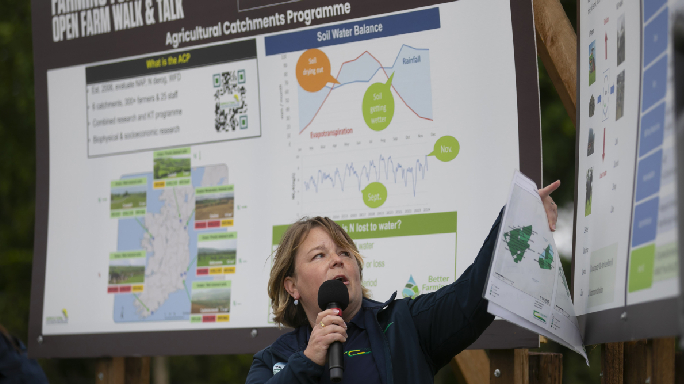
Sandra Hayes, Co-Coordinator of the Tirlán Teagasc Future Farm Programme said: “It’s all about everyone now doing a percentage extra, maximising their nutrient efficiency, spreading slurry only at optimal times. There is no one silver bullet to sort this. It’s not just the monitor farmers who will make our case.”
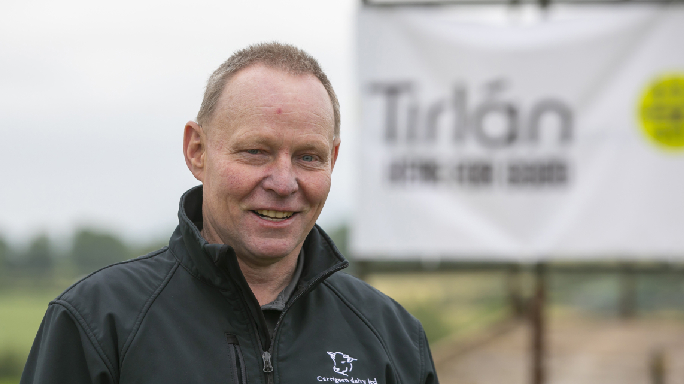
Farmer Donal Kavanagh explained the steps taken on farm to become more sustainable including reducing the use of chemical nitrogen by 33% since 2021 through the use of clover, which is a natural nitrogen fixer, in grass.
“Soil fertility has improved greatly over the last few years but so also has our knowledge on soil nutrient requirements. We got our slurries tested from all the slurry tanks and the slurry tower. From these results we now know our N, P and K for each 1000 gallons of slurry. The N figure can vary, depending on the time of year and the method of slurry spreading used. We aim to spread our slurry in the spring time by LESS technologies, including the trailing shoe, dribble bar or umbilical system.
“By knowing the NPK of our slurry we can cut back on the amount of chemical fertiliser required. Instead of under or over estimating what we require, we now can be very exact in our fertiliser applications.
“Once we get our soil sample results back our nutrient management plan otherwise known as our fertiliser plan we can plan our purchase list. The plan takes into account how much slurry we produce and it allocates it back to the paddocks or fields that require it the most.
“The tailored plan then shows us what type and quantities of fertilisers that is required after slurry is spread. This is very important for low P and K fields to rebuild soils Indexes to Index 3 and 4. There are certain fields that have a high percentage of clover so those fields will need P and K, but also half rate nitrogen levels to encourage the clover to fix its own nitrogen source”.
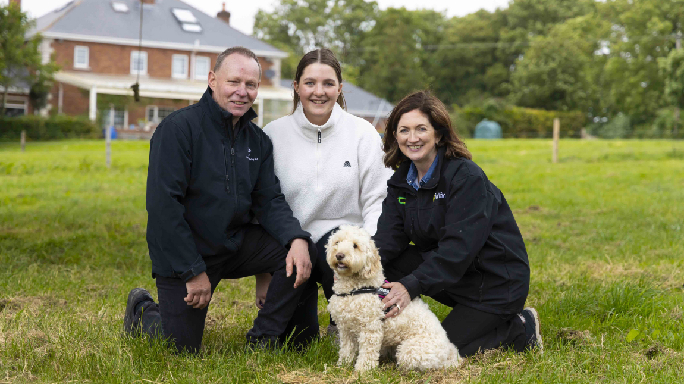
The farm walk also heard how Tirlán continues to work closely with farm family suppliers every day, to address water quality and improve on-farm economic and environmental performance, through programmes including the Sustainability Action Payment, FarmGen, Sustainable Farming Academy, Twenty20 Beef Club and ASSAP.
On water quality Tirlán’s good work continues, with almost 800 farm visits completed in 2023. This good work is paying dividend, with the most recent EPA report showing a marginal improvement of water quality in the South-East.
- Any farm family that would like to a water quality remediation plan developed for their farms can contact any Agri Sustainability Team Members including Sean Martyn at 086-1763036.
| Sandra Hayes, Co-ordinator of the Teagasc Tirlán Future Farm Programme reflects on Fridays Event - Read HERE |
First Published 25 June 2024